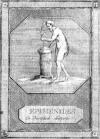Biography
Other info : Bibliography
Epimenides of Knossos (Crete) (Greek: Ἐπιμενίδης) was a semi-mythical 7th or 6th century BC Greek seer and philosopher-poet. While tending his father's sheep, he is said to have fallen asleep for fifty-seven years in a Cretan cave sacred to Zeus, after which he reportedly awoke with the gift of prophecy (Diogenes Laërtius i. 109–115). Plutarch writes that Epimenides purified Athens after the pollution brought by the Alcmeonidae, and that the seer's expertise in sacrifices and reform of funeral practices were of great help to Solon in his reform of the Athenian state. The only reward he would accept was a branch of the sacred olive, and a promise of perpetual friendship between Athens and Cnossus (Plutarch, Life of Solon, 12; Aristotle, Ath. Pol. 1).
Athenaeus also mentions him, in connection with the self-sacrifice of the erastes and eromenos pair of Cratinus and Aristodemus, who were believed to have given their lives in order to purify Athens. Even in antiquity there were those who held the story to be mere fiction (The Deipnosophists, XIII. 78–79). Diogenes Laërtius preserves a number of spurious letters between Epimenides and Solon in his Lives of the Philosophers. Epimenides was also said to have prophesied at Sparta on military matters.
He died in Crete at an advanced age; according to his countrymen, who afterwards honoured him as a god, he lived nearly three hundred years. According to another story, he was taken prisoner in a war between the Spartans and Cnossians, and put to death by his captors, because he refused to prophesy favourably for them. Pausanias reports that when Epimenides died, his skin was found to be covered with tattooed writing. This was considered odd, because the Greeks reserved tattooing for slaves. Some modern scholars have seen this as evidence that Epimenides was heir to the shamanic religions of Central Asia, because tattooing is often associated with shamanic initiation. The skin of Epimenides was preserved at the courts of the ephores in Sparta, conceivably as a good-luck charm. Epimenides is also reckoned with Melampus and Onomacritus as one of the founders of Orphism.






